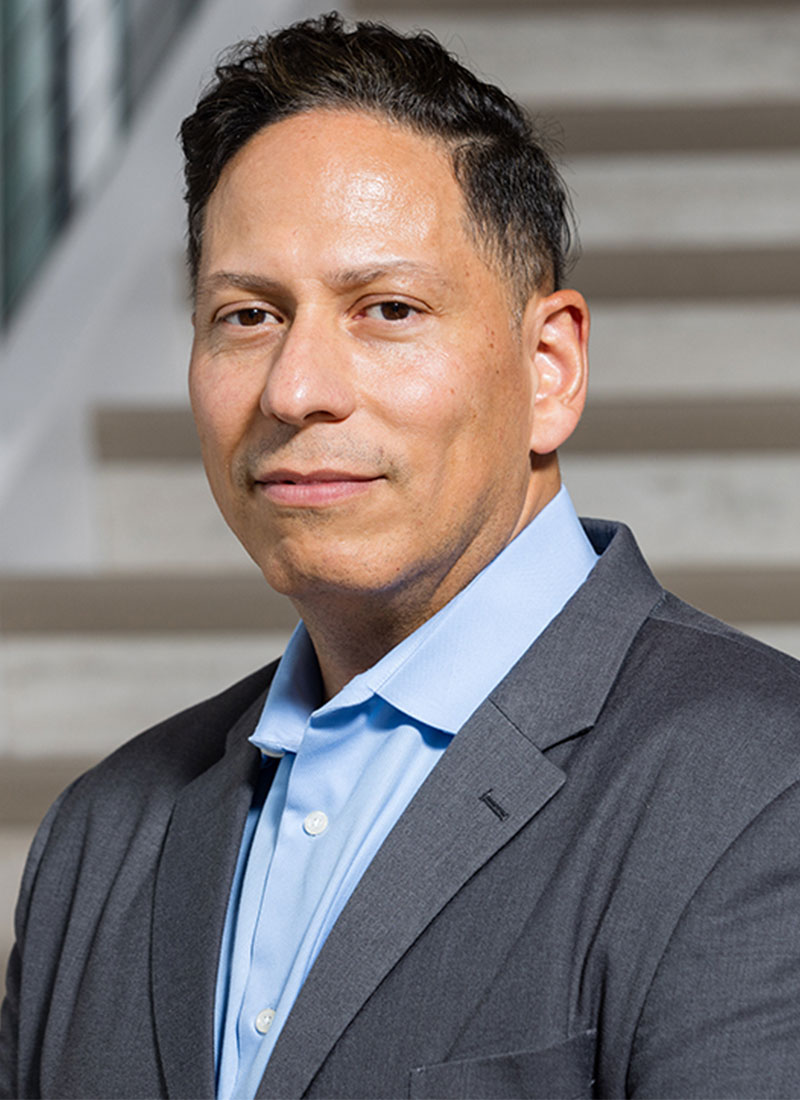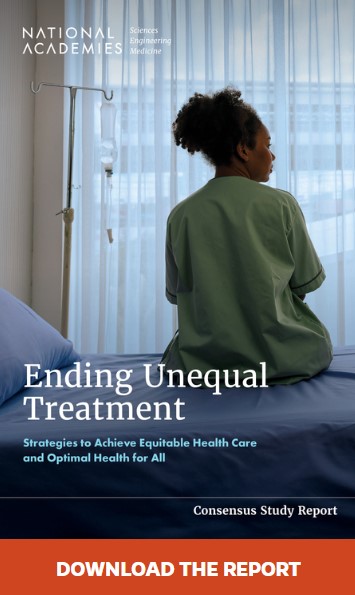Ending Health Inequities
Latest | Home | About | Our People | CLAFH | Events | News | Stories | IPS Affiliates | Training
Ending Unequal Treatment: Strategies to Achieve Equitable Health Care and Optimal Health for All
Dear Colleagues,
The National Academies of Sciences, Engineering, and Medicine (NASEM) has released Ending Unequal Treatment: Strategies to Achieve Equitable Health Care and Optimal Health for All. This report provides a comprehensive update to the Institute of Medicine’s 2003 landmark report, Unequal Treatment: Confronting Racial and Ethnic Disparities in Health Care, which is widely considered one of the most groundbreaking reports on health care equity. I wish I could boast that the U.S. is well on its way to achieving health equity but in the two decades between these two reports, little progress has been made, so racial and ethnic inequities remain a fundamental flaw of our health care system.
Despite the dangerously high human and financial costs of health inequities — which have grown to unsustainable heights — the nation has historically lacked the political will to fix the problem. Ending Unequal Treatment highlights that the health differences seen in minoritized populations are emblematic of injustices not only in the U.S. health care system but in society at large. To end racial and ethnic inequities in health and health care we must invest in new models that ensure care is delivered equitably, while also investing in social policies and programs that support families and communities like housing, education and food access. Investing in the health of minoritized groups is not a zero-sum game: The investments do not mean a loss for majority groups. In fact, the report finds that investing in those most at risk of health inequity benefits everyone. This should be taken as a call-to-action to muster the political will required for progress.
The report also challenges us to reimagine our health care system’s priorities and processes. Our current system is organized largely to provide sick care, with a financing system that incentivizes expensive treatments and procedures. What we need is a health care system that delivers “whole person” care by providing health promotion and disease prevention as well as clinical care when needed.
We are nurses, so we can move mountains. I challenge each of us—whether we work on the front line, in academia, in policy, as nurse scientists, or in other sectors—to resist the status quo and commit our efforts to creating a new health care system that delivers optimal health for everyone.
Vincent Guilamo-Ramos
Key to this effort will be our nation’s highly skilled nursing workforce, which is instrumental to providing the kind of person-centered care that can help end health care inequities. At more than 6 million strong, nurses are the largest segment of the health care workforce, contributing invaluable expertise and leadership in all areas of health. Voted the most trusted of all professions for more than 22 years, we have public opinion on our side. We have proven time and time again, whether during a natural disaster or global pandemic, that nurses are effective innovators, and we move mountains to achieve our goals.
I encourage you to join us — whether we work on the front line, in academia, in policy, as nurse scientists or in other sectors—to commit to creating a new system that delivers optimal health for everyone.
Sincerely,
Vincent Guilamo-Ramos, PhD, MPH, LCSW, ANP-BC, PMHNP-BC, FAAN
Executive Director, Institute for Policy Solutions and Professor
Johns Hopkins School of Nursing

Doing Our Part
At the Institute for Policy Solutions, we are determined to translate Ending Unequal Treatment into action, so that 20 years after the release of this report we can finally say that health inequities are a relic of the past. We will be amplifying many of the report’s recommendations, with a special focus on the roles that nurses can play as change agents in eliminating health care inequities.
- We will be challenging policymakers to pursue real reform by illustrating that investments in health equity for racial/ethnic minoritized communities are not a zero-sum game but benefit everyone.
- We will advocate for a new model of health care delivery that shifts from a primary focus on diagnosing and treating illness to one that optimizes a combination of clinical and social care with the goal of promoting wellness, prevention and health promotion.
- We will illustrate the power of nurse-led models of care that leverage the collective strengths of interprofessional teams to deliver trustworthy, person-centered care that builds collaborative relationships with patients, their families and their communities.
- Following the admired examples set by the National Institute for Nursing Research and the National Institute on Minority Health and Health Disparities, we will advocate for greater investments in health equity research.
- We will be launching a training program focused on ending health care inequities and we also will work with other nursing, allied health and medical schools to ensure that the clinical and scientific workforce is prepared to conduct research and deliver primary care that eliminates health inequities.
Ending Unequal Treatment
Release Webinar
Conceptual Framework for Ending Health and Health Care Inequities

Ending Unequal Treatment in the
United States Health Care System
Vincent Guilamo-Ramos et al.
SPEAKING OF HEALTH INEQUITIES…
Health vs. Health Care
Health is a term used to describe physical, mental, and social well-being outcomes.
Health care refers to the services provided to individuals, families, and communities for the purpose of promoting, maintaining, or restoring health across settings of care.
Health Care Equity
Health Care Equity aims to eliminate inequities in health outcomes and can only be achieved when both the health care system and society at large ensure that all individuals receive appropriate and timely health care services that are responsive to their unique needs, without discrimination or barriers based on factors such as race, ethnicity, gender, socioeconomic status, geographic location, or other characteristics.
Health Disparities vs. Health Inequities
Health disparities are racial or ethnic differences in the quality of health care that are not due to access-related factors or clinical needs, preferences, and appropriateness of intervention.
Health inequities refer to a state of being in which people are denied the possibility of being healthy by belonging to a group that has historically been economically and socially disadvantaged. In that context, it is an avoidable, unnecessary, and unjust health difference.
Unequal vs Inequitable Treatment
Unequal treatment implies that health care inequities could be eliminated by providing the same treatment to all patients regardless of their race or ethnicity.
Equitable treatment entails making treatment recommendations that consider the determinants of health and do not disadvantage an individual based on race, ethnicity, or social position.
Racially and Ethnically Minoritized Groups
Racially and ethnically minoritized refers to groups that have been historically and systematically socially and economically marginalized or underserved based on their race or ethnicity because of racism.
Adapted from Ending Unequal Treatment: Strategies to Achieve Equitable Health Care and Optimal Health for All.

#Nurses4HealthEquity
More than 6 million strong, the field of nursing is critical to any health care reform that aims to end health and health care inequities. Help raise our visibility by speaking up in conversations about health equity and use #Nurses4HealthEquity in your social media engagements.

TOOLS & RESOURCES
Explore our growing collection of tools and resources to help eliminate health and health care inequities.

